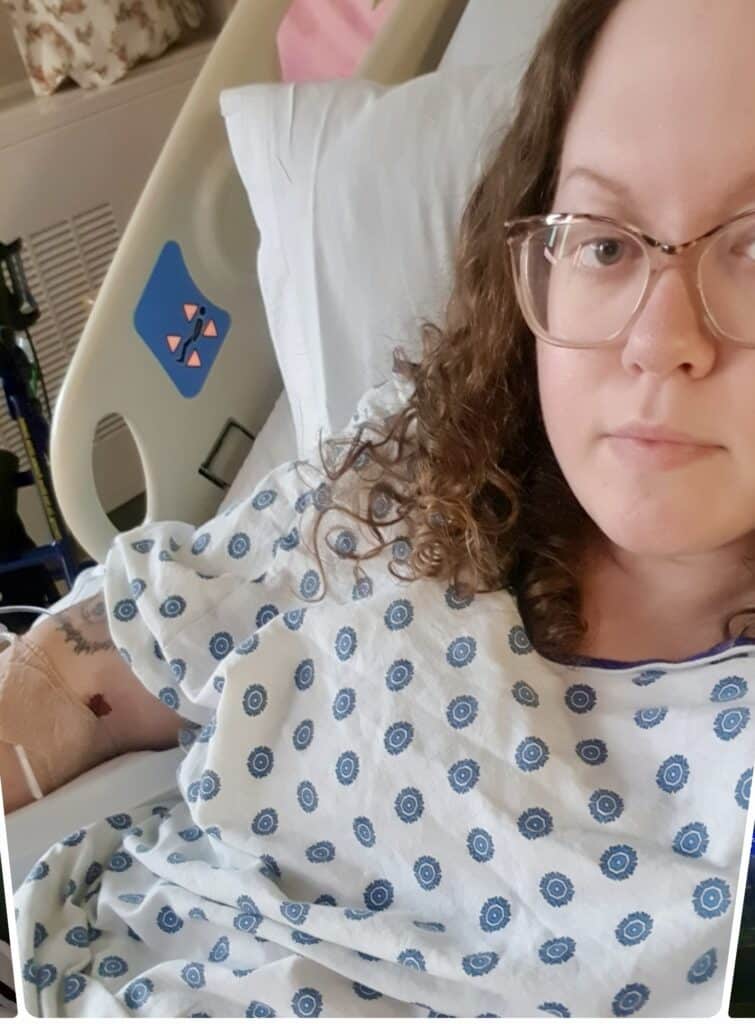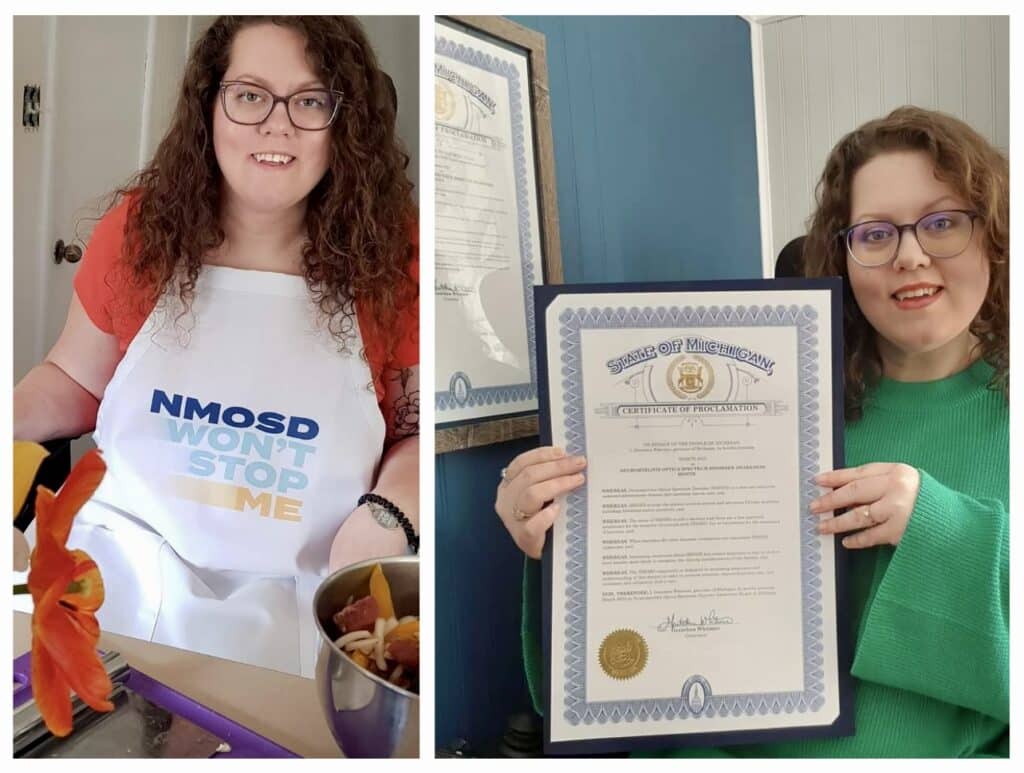
Choose Your Language:
Posted by: The Sumaira Foundation in NMO, Patient, TM, Voices of NMO

It all began in early 2020 when Kayla noticed a tingling sensation in her right leg. She didn’t think too much about it and figured it would go away. Thinking it was a pinched nerve, she went to the chiropractor. The problem was that it got worse. The tingling progressed, leaving her leg weak and feeling heavy.
When she woke up one day with excruciating back pain and her right leg completely numb, her fiance rushed her to the emergency room. The doctors ordered an MRI, which revealed a bulging disc, and she was referred to a surgeon.
Things got more complicated when the consulting surgeon told her she didn’t need back surgery.
The next few months were arduous as Kayla saw countless doctors. The lack of answers was frustrating as her condition worsened.
After years of working as an advocate in the mental health field, Kayla realized she needed help. She enlisted a patient advocate. With their assistance, Kayla finally got an appointment with a neurologist at Henry Ford Hospital in Detroit, almost four hours away from her small hometown.
She knew effective communication and organization would be crucial to managing her complex condition. She started keeping a detailed medical logbook. This helped coordinate her care between her local clinicians and specialists in different medical systems. As her condition deteriorated, the logbook proved invaluable for tracking treatments, medications, and progress.
The day finally came. The neurologist spent more than 20 minutes explaining that the tests showed Kayla had longitudinal extensive transverse myelitis (LETM). Months before this, a doctor had suggested maybe Kayla had multiple sclerosis (MS), but her new neurologist suspected neuromyelitis optica spectrum disorder (NMOSD) and ordered more testing.
When she got home, she began searching for information about NMOSD. The results were bittersweet. The search engine returned outdated information about the lifespan of NMOSD patients. However, she also stumbled across an online community of people with NMOSD who were thriving.
While having an actual diagnosis was a relief, there was still so much uncertainty about the future. Kayla turned to the online support groups and began to learn everything she could about her condition.
Kayla began treatments, but the following year was full of setbacks from relapses. Lesions on her spine, brain, and optic nerves left her battling chronic pain, neuropathy, spasticity, neurogenic bladder, lymphedema, fatigue, and brain fog.
The diagnosis may have been an answer, but she still needed solutions to the new challenges NMOSD created. Grappling with the reality of paralysis, she would need to find a way to navigate her daily life. Simple tasks that were once taken for granted became monumental feats.
Kayla’s years working in community-based mental health helped her understand the emotional toll a life-altering diagnosis has on a person’s life, and she realized she was struggling to come to terms with it all.
Refusing to let depression take over, she began to seek out the positives. “There’s a positive every day, somewhere, and I feel like a lot of people forget because they’re so down or not doing well. But it could be something like, I got my favorite drink today. Or my orchid bloomed today. Last night, it was closed. Today, I woke up, and it was open. I was like, wow, so today it’s gonna be a good day.”
She spent months working with physical and occupational therapists, building her strength and learning to move her body again.
Using adaptive tools and modifications like the custom-built kitchen shelves her dad made and her electric wheelchair, she was able to dive back into her love of cooking, which helped open up her world again.
Even with low vision, Kayla found new ways to keep capturing the beauty around her. As a long-time hobby, photography became a way to process all the changes in her life.
A pivotal day in Kayla’s journey came when the local Lions Club and Habitat for Humanity showed up and turned her yard into a work zone. The Volunteers spent the next few days in the freezing Michigan weather building her a handicapped-accessible ramp to her home.
It was an incredible show of support from her fiance, and friends, but also by people she didn’t even know. Kayla was overwhelmed and wanted to channel that gratitude into helping others. Despite her challenges, Kayla knew she could use her skills and experiences to help people come together and raise awareness for NMOSD.
Thinking back to when she first heard of NMOSD and the support she found through online groups, she found her way to The Sumaira Foundation as a way to make a positive impact.

Kayla has actively advocated for NMOSD and rare disease awareness at the local, state, and national levels.
Sharing her story has been a powerful tool that took her on an unexpected and delicious journey. In 2022, Horizon Therapeutics highlighted Kayla’s Unstoppable Story as part of its NMOSD Won’t Stop Me campaign. She then traveled to Houston, Texas, to meet fellow NMOSD patient and world-famous MasterChef Christine Ha.
Kayla’s efforts also led to the Governor of Michigan declaring March as Neuromyelitis Optica Spectrum Disorder Awareness Month.
At the end of the day, Kayla understands how difficult living with a rare disease is but believes that we can all make a difference.
Her approach to advocacy is similar to her approach to life these days. “Little steps lead to big steps. I say this to myself every day because when I was trying to learn how to walk again, I would fall sometimes. But when I took small steps, I was able to start moving forward. And I knew that to get from A to B, this is what I would have to do. Those steps may be small and slow as heck, but they got me from A to B. And like anything in life, when you take the little steps, they turn into bigger ones.”